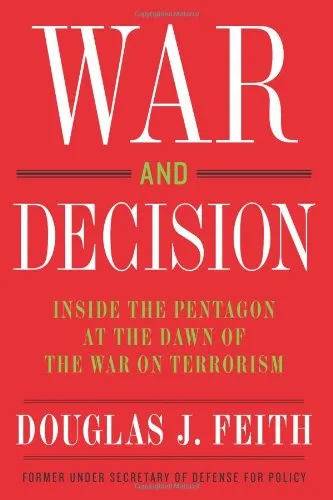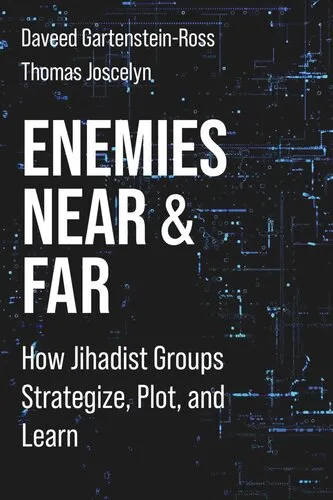War and Decision: Inside the Pentagon at the Dawn of the War on Terrorism
4.2
Reviews from our users

You Can Ask your questions from this book's AI after Login
Each download or ask from book AI costs 2 points. To earn more free points, please visit the Points Guide Page and complete some valuable actions.Related Refrences:
Introduction to "War and Decision: Inside the Pentagon at the Dawn of the War on Terrorism"
"War and Decision: Inside the Pentagon at the Dawn of the War on Terrorism" is a deeply revealing and highly detailed account of the critical decisions made by U.S. government leaders in the aftermath of the September 11, 2001, terrorist attacks. Written by Douglas J. Feith, who served as the Under Secretary of Defense for Policy under President George W. Bush, this book offers an insider’s perspective on the complex calculations that shaped the United States’ strategy for the Global War on Terrorism.
Douglas J. Feith sheds light on topics often misunderstood by the public and media alike, taking readers through pivotal moments such as the policy foundation for the wars in Afghanistan and Iraq, the formulation of counterterrorism strategies, and the broader reorientation of U.S. defense policy to confront 21st-century threats. The book also examines accusations and controversies faced by the Bush Administration, offering evidence and arguments to counter widespread misconceptions.
Unlike many narratives that oversimplify or sensationalize, "War and Decision" is a rigorous, evidence-backed account supported by official documents, internal Pentagon communications, and Feith’s firsthand experiences. Written with precision and clarity, the book invites readers to engage critically with the policies and strategies that defined a precarious era in U.S. history. Whether one agrees or disagrees with the decisions discussed, the book challenges audiences to think deeply about national security, governance, and the intricacies of decision-making in times of crisis.
Detailed Summary
"War and Decision" breaks down the key events and policies that emerged during the U.S. government’s immediate response to September 11th. The book recounts how the Defense Department and other federal agencies developed strategies to combat terrorism globally while also addressing unprecedented security concerns at home. Feith explains the rationale behind top-level decisions, including the overthrow of the Taliban regime in Afghanistan, the buildup to the Iraq War, and the efforts to balance military operations with diplomatic initiatives.
The narrative highlights the intense debates within the Bush Administration regarding long-term national security priorities. Feith tackles contentious topics such as intelligence assessments regarding weapons of mass destruction (WMDs), the decision to aim for regime change in Iraq, and the structural challenges of post-conflict stabilization and reconstruction.
This detailed account also highlights the Defense Department’s role in shaping policies such as the formation of coalitions, the handling of detainee issues, and the creation of counterinsurgency measures. By providing clear documentation and contextual analysis, Feith allows readers to grasp the complexity of decisions made under extraordinary circumstances.
Key Takeaways
- Complex Decision-Making Process: Key national security decisions often involve competing priorities, limited information, and intense interagency debate.
- The Role of Policy in Shaping Strategy: Feith demonstrates how policies are not only influenced by immediate crises but also shaped by broader strategic objectives and historical contexts.
- Importance of Evidence-Based Analysis: The book emphasizes the necessity of using documented evidence to counter misconceptions and misunderstandings in public discourse.
- Challenges of Post-War Stabilization: Feith articulates how planning for post-conflict scenarios demands as much attention as planning military operations.
- A Fresh Perspective on Controversial Issues: Readers gain insight into the reasons behind many controversial policies, helping them appreciate the complexities of governance during wartime.
Famous Quotes from the Book
"Critics of the Iraq war too often make the mistake of assuming that policymakers knew, or should have known, the full consequences of their actions in advance."
"Good policy requires not only vision and principles but also the discipline to account for practical realities and unintended consequences."
"War is a last resort, but when it occurs, it must be a projection of resolve and strategic clarity."
Why This Book Matters
For readers seeking a comprehensive understanding of U.S. policy and decision-making during the formative years of the War on Terror, "War and Decision" is an invaluable resource. The book is not merely a historical account—it is a blueprint for evaluating how governments approach national security challenges in real time. By presenting a meticulous dissection of events and policies, Feith challenges the overly simplistic narratives that have come to dominate public discourse.
Moreover, this book offers lessons for current and future policymakers, particularly in understanding how to manage crisis situations, address uncertainties, and prioritize competing values such as security, liberty, and international order. "War and Decision" ultimately underscores the moral and strategic weight behind decisions that shape the course of history, making it a must-read for scholars, students, and citizens alike.
Free Direct Download
You Can Download this book after Login
Accessing books through legal platforms and public libraries not only supports the rights of authors and publishers but also contributes to the sustainability of reading culture. Before downloading, please take a moment to consider these options.
Find this book on other platforms:
WorldCat helps you find books in libraries worldwide.
See ratings, reviews, and discussions on Goodreads.
Find and buy rare or used books on AbeBooks.
1229
بازدید4.2
امتیاز50
نظر98%
رضایتReviews:
4.2
Based on 0 users review
"کیفیت چاپ عالی بود، خیلی راضیام"
Questions & Answers
Ask questions about this book or help others by answering
No questions yet. Be the first to ask!



